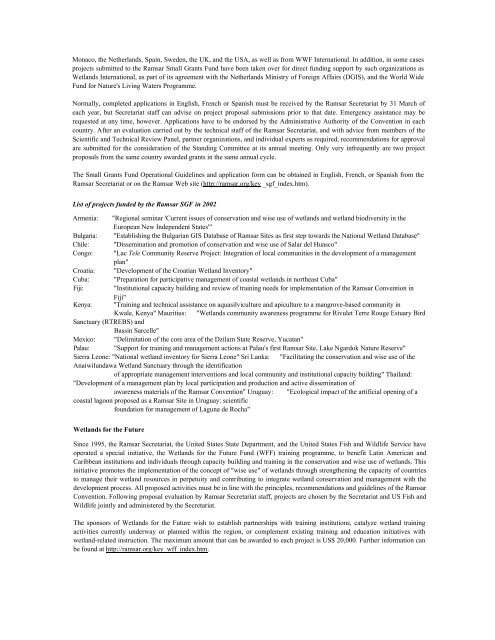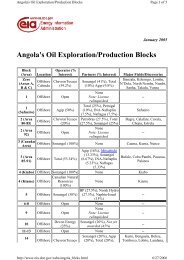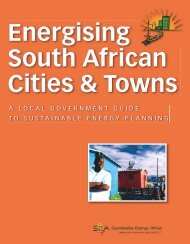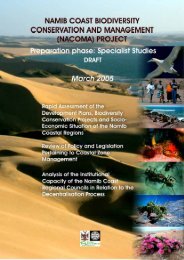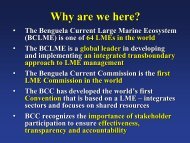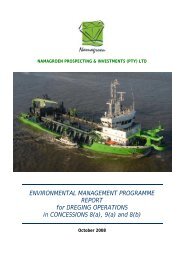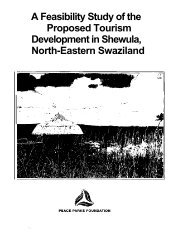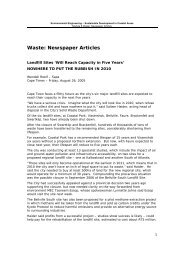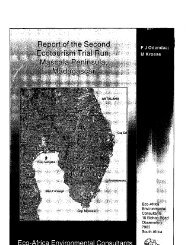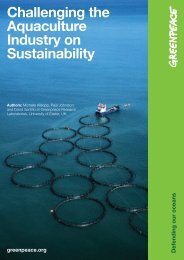The Ramsar Convention Manual.pdf
The Ramsar Convention Manual.pdf
The Ramsar Convention Manual.pdf
Create successful ePaper yourself
Turn your PDF publications into a flip-book with our unique Google optimized e-Paper software.
Monaco, the Netherlands, Spain, Sweden, the UK, and the USA, as well as from WWF International. In addition, in some cases<br />
projects submitted to the <strong>Ramsar</strong> Small Grants Fund have been taken over for direct funding support by such organizations as<br />
Wetlands International, as part of its agreement with the Netherlands Ministry of Foreign Affairs (DGIS), and the World Wide<br />
Fund for Nature's Living Waters Programme.<br />
Normally, completed applications in English, French or Spanish must be received by the <strong>Ramsar</strong> Secretariat by 31 March of<br />
each year, but Secretariat staff can advise on project proposal submissions prior to that date. Emergency assistance may be<br />
requested at any time, however. Applications have to be endorsed by the Administrative Authority of the <strong>Convention</strong> in each<br />
country. After an evaluation carried out by the technical staff of the <strong>Ramsar</strong> Secretariat, and with advice from members of the<br />
Scientific and Technical Review Panel, partner organizations, and individual experts as required, recommendations for approval<br />
are submitted for the consideration of the Standing Committee at its annual meeting. Only very infrequently are two project<br />
proposals from the same country awarded grants in the same annual cycle.<br />
<strong>The</strong> Small Grants Fund Operational Guidelines and application form can be obtained in English, French, or Spanish from the<br />
<strong>Ramsar</strong> Secretariat or on the <strong>Ramsar</strong> Web site (http://ramsar.org/key _sgf_index.htm).<br />
List of projects funded by the <strong>Ramsar</strong> SGF in 2002<br />
Armenia: "Regional seminar 'Current issues of conservation and wise use of wetlands and wetland biodiversity in the<br />
European New Independent States'"<br />
Bulgaria: "Establishing the Bulgarian GIS Database of <strong>Ramsar</strong> Sites as first step towards the National Wetland Database"<br />
Chile: "Dissemination and promotion of conservation and wise use of Salar del Huasco"<br />
Congo: "Lac Tele Community Reserve Project: Integration of local communities in the development of a management<br />
plan"<br />
Croatia: "Development of the Croatian Wetland Inventory"<br />
Cuba: "Preparation for participative management of coastal wetlands in northeast Cuba"<br />
Fiji: "Institutional capacity building and review of training needs for implementation of the <strong>Ramsar</strong> <strong>Convention</strong> in<br />
Fiji"<br />
Kenya: "Training and technical assistance on aquasilviculture and apiculture to a mangrove-based community in<br />
Kwale, Kenya" Mauritius: "Wetlands community awareness programme for Rivulet Terre Rouge Estuary Bird<br />
Sanctuary (RTREBS) and<br />
Bassin Sarcelle"<br />
Mexico: "Delimitation of the core area of the Dzilam State Reserve, Yucatan"<br />
Palau: "Support for training and management actions at Palau's first <strong>Ramsar</strong> Site, Lake Ngardok Nature Reserve"<br />
Sierra Leone: "National wetland inventory for Sierra Leone" Sri Lanka: "Facilitating the conservation and wise use of the<br />
Anaiwilundawa Wetland Sanctuary through the identification<br />
of appropriate management interventions and local community and institutional capacity building" Thailand:<br />
"Development of a management plan by local participation and production and active dissemination of<br />
awareness materials of the <strong>Ramsar</strong> <strong>Convention</strong>" Uruguay: "Ecological impact of the artificial opening of a<br />
coastal lagoon proposed as a <strong>Ramsar</strong> Site in Uruguay: scientific<br />
foundation for management of Laguna de Rocha"<br />
Wetlands for the Future<br />
Since 1995, the <strong>Ramsar</strong> Secretariat, the United States State Department, and the United States Fish and Wildlife Service have<br />
operated a special initiative, the Wetlands for the Future Fund (WFF) training programme, to benefit Latin American and<br />
Caribbean institutions and individuals through capacity building and training in the conservation and wise use of wetlands. This<br />
initiative promotes the implementation of the concept of "wise use" of wetlands through strengthening the capacity of countries<br />
to manage their wetland resources in perpetuity and contributing to integrate wetland conservation and management with the<br />
development process. All proposed activities must be in line with the principles, recommendations and guidelines of the <strong>Ramsar</strong><br />
<strong>Convention</strong>. Following proposal evaluation by <strong>Ramsar</strong> Secretariat staff, projects are chosen by the Secretariat and US Fish and<br />
Wildlife jointly and administered by the Secretariat.<br />
<strong>The</strong> sponsors of Wetlands for the Future wish to establish partnerships with training institutions, catalyze wetland training<br />
activities currently underway or planned within the region, or complement existing training and education initiatives with<br />
wetland-related instruction. <strong>The</strong> maximum amount that can be awarded to each project is US$ 20,000. Further information can<br />
be found at http://ramsar.org/key_wff_index.htm.


